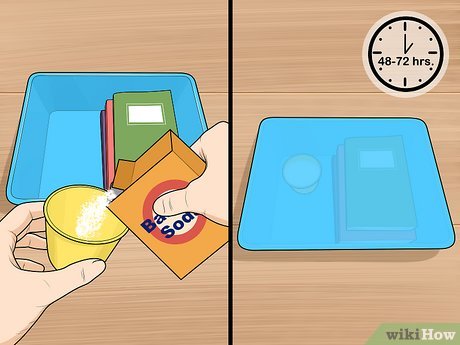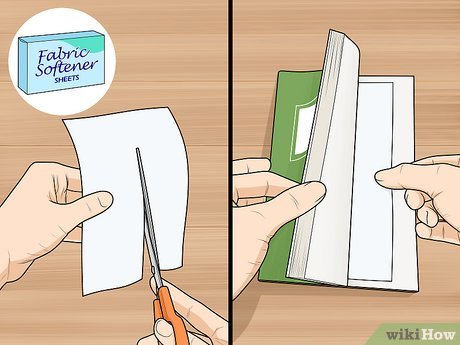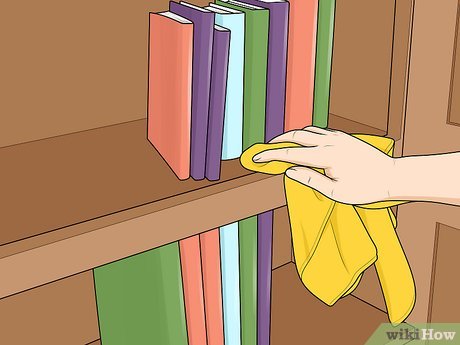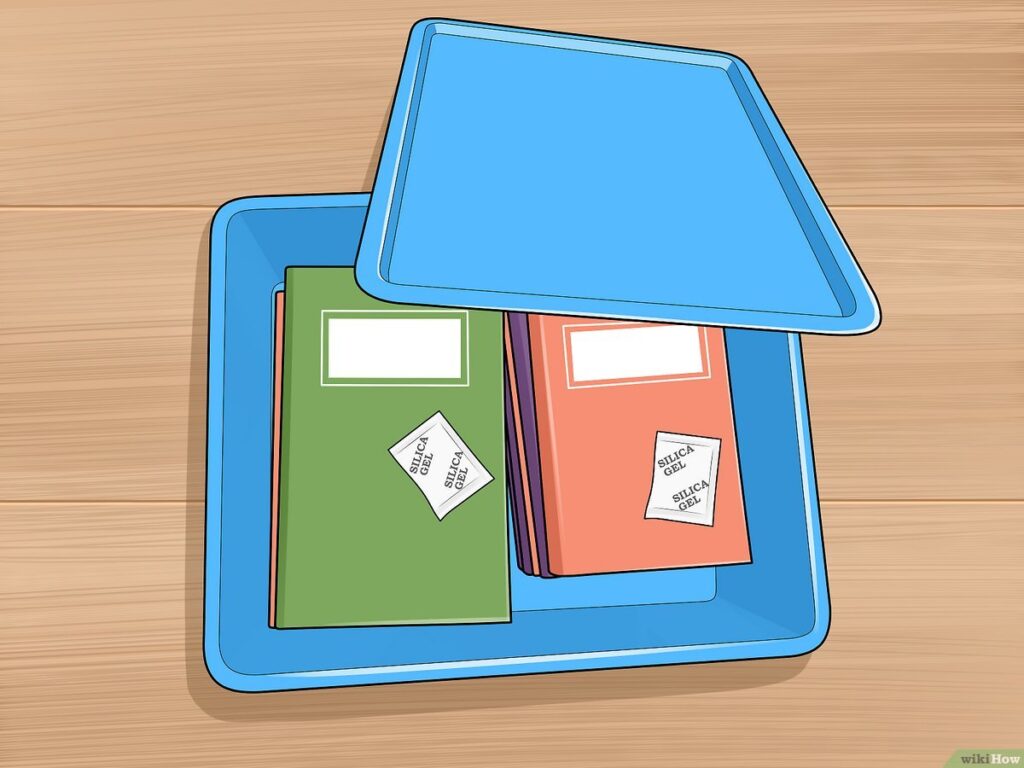In “How To Remove Mold Smell From Books: Preserving Your Library And Getting Rid Of Musty Odors,” you will discover effective methods to combat the unpleasant smell of mold in your beloved books. Whether you have a small collection or a vast library, this article provides practical tips and techniques to preserve your books and eliminate musty odors. With easy-to-follow steps and helpful advice, you can ensure that your personal library remains fresh and enjoyable for years to come. Say goodbye to the unpleasant smell and hello to a renewed reading experience!
Reasons for Moldy Smell in Books
Introduction to Moldy Smell
Have you ever picked up a book from your collection and noticed a musty, moldy smell? It can be quite unpleasant, not to mention a potential health hazard. Mold growth in books is a common issue that many book lovers often face. The moldy smell is a result of the growth of fungi and mold spores that thrive in dark, damp environments. It can not only damage your books but also have detrimental effects on your health. In this article, we will explore the common causes of moldy smell in books and provide you with comprehensive solutions to remove the odor and preserve your beloved library.
Common Causes of Moldy Smell in Books
Several factors contribute to the development of a moldy smell in books. One of the primary causes is exposure to excessive moisture. Books stored in areas with high humidity, such as basements or poorly ventilated spaces, are at a higher risk of mold growth. Other common causes include water damage from leaks or floods, inadequate storage conditions, and prolonged exposure to damp or humid environments. It is essential to address these factors to prevent the recurrence of moldy smells.
Assessing the Severity of Mold Damage
Visual Inspection
Before jumping into the mold removal process, it is crucial to assess the severity of the mold damage. Begin by visually inspecting your books for visible signs of mold growth. Look for black, green, or grey patches, discolored pages, or fuzzy textures. If you notice extensive mold infestation or structural damage, it may be advisable to seek professional assistance for restoration.
Exposure to Moisture
Determining the level of exposure to moisture is another vital step in assessing mold damage. Books stored in damp places, exposed to leaks, or affected by water damage are more likely to have a strong moldy smell. Take note of any signs of water stains, dampness, or a musty odor coming from the pages of your books.
Types of Mold
Different types of mold can inhabit books, each with its own distinct smell. While mildew has a musty odor, other molds may emit a sour, earthy, or even a metallic smell. Identifying the specific type of mold can be challenging without professional analysis, but it can provide valuable insight into the extent of the damage and the necessary treatment methods.

Precautions to Take Before Cleaning
Safety Precautions
Before embarking on the cleaning process, it is essential to prioritize your safety. Mold spores can be harmful when inhaled, leading to respiratory issues and allergic reactions. Therefore, it is crucial to wear protective clothing, including gloves, a mask, and goggles, to avoid direct contact with mold and its spores. Additionally, ensure proper ventilation in the cleaning area to prevent the accumulation of airborne spores.
Isolation of Infected Books
To prevent the spread of mold spores to your other books, it is essential to isolate the affected books. Place them in a sealed plastic bag or airtight container to contain the spores and minimize the risk of cross-contamination. Remember to handle the infected books with care to avoid dispersing mold spores into the air.
Ventilation
Proper ventilation is key when dealing with moldy books. Choose a well-ventilated area such as a screened-in porch or a room with windows that can be opened. Good air circulation helps to reduce the concentration of mold spores in the environment, making it easier to remove the moldy smell from your books.
Natural Methods to Remove Mold Smell
Sunlight Exposure
One of the easiest and most effective ways to remove the moldy smell from books is by exposing them to sunlight. Find a sunny spot outdoors or near a bright window and lay the books flat with their open pages exposed to the sunlight. Sunlight not only helps to eliminate mold spores but also acts as a natural disinfectant. Leave the books out for a few hours, turning the pages occasionally to ensure even exposure.
Baking Soda
Baking soda is a versatile natural ingredient known for its ability to absorb odors. To use baking soda for removing mold smell from books, sprinkle a thin layer of baking soda over the pages of the affected books. Allow the books to sit for a few days in a cool, dry place, and then gently brush off the baking soda residue. This method helps absorb the musty odor effectively.
Activated Charcoal
Activated charcoal is another excellent natural deodorizer that can help eliminate the moldy smell from your books. Place a few pieces of activated charcoal in a container or sock, and then put it alongside the affected books. The charcoal will absorb the moisture and odor from the books, gradually reducing the mold smell. Leave it in place for several days before removing.
Vinegar Solution
Vinegar is a powerful natural disinfectant and deodorizer that can help eliminate mold smell from books. Mix equal parts of distilled white vinegar and water in a spray bottle. Lightly mist the affected books with the vinegar solution, ensuring that all pages are lightly dampened. The vinegar will kill the mold spores and neutralize the odor. Allow the books to air dry in a well-ventilated area, preferably outdoors.
Kitty Litter
Kitty litter, especially the non-clumping kind, can help absorb moisture and eliminate the mold smell from books. Place the affected books in a container or a ziplock bag, along with a small amount of kitty litter. Seal the container and leave it undisturbed for a few days. The kitty litter will absorb the excess moisture and help remove the musty odor from the books.

Commercial Cleaning Products for Mold Removal
Antifungal Sprays
If natural methods do not yield satisfactory results, there are commercial antifungal sprays available specifically designed for mold removal. These sprays contain ingredients that effectively kill mold spores and eliminate the moldy smell from books. Follow the manufacturer’s instructions for safe and effective use, ensuring proper ventilation during the application process.
Hydrogen Peroxide
Hydrogen peroxide is a powerful disinfectant that can effectively kill mold and remove the mold smell. Dilute 3% hydrogen peroxide with an equal amount of water and use a spray bottle to mist the affected books. Allow the solution to sit for a few minutes before gently wiping it off with a clean cloth. Ensure the books are thoroughly dried to prevent mold regrowth.
Mold Removal Wipes
Mold removal wipes are a convenient and effective option for cleaning moldy books. These pre-moistened wipes are specially formulated to kill mold spores and remove the musty odor. Gently wipe down the pages and covers of the affected books with the mold removal wipes, being careful not to oversaturate the pages. Allow the books to air dry in a well-ventilated area.
Cleaning Techniques for Moldy Books
Dusting and Vacuuming
Before proceeding with any cleaning method, it is important to remove loose mold spores and debris from the surface of the books. Use a soft brush or cloth to gently dust off the pages and covers, ensuring that the spores are not dispersed into the air. For hardcover books, it is advisable to use a vacuum cleaner with a brush attachment to remove any debris from the bookbinding.
Dry Cleaning
Dry cleaning is a non-invasive method to remove moldy smells from books without the use of liquids. Place the affected books in a breathable container, such as a paper bag or a pillowcase, along with desiccant packets. Leave the books in the container for several days to absorb the moisture and musty odor. Remember to periodically check the condition of the books to prevent over-drying.
Wet Cleaning
Wet cleaning is a more intensive method for removing mold smell from books. However, it should only be used for books that can withstand moisture without sustaining further damage. Prepare a mild detergent solution with warm water and use a clean cloth or sponge to gently wipe down the pages and covers of the affected books. Avoid oversaturating the pages and ensure thorough drying to prevent mold regrowth.

Restoring Leather-bound Books
Leather Conditioning
Leather-bound books require special care to prevent damage and preserve their timeless appeal. To remove the moldy smell from leather covers, begin by gently wiping the surface with a clean, damp cloth. Once the surface is dry, apply a small amount of leather conditioner using a soft cloth or sponge. Massage the conditioner into the leather in circular motions, ensuring full coverage. Allow the books to air dry before assessing the odor.
Deodorizing Leather
To eliminate the mold smell from leather-bound books, you can use various natural deodorizers such as baking soda or activated charcoal. Sprinkle a small amount of baking soda or place a few pieces of activated charcoal on top of the leather cover. Allow it to sit for a few days, and then gently brush off the residue. These natural deodorizers will absorb the odor, leaving your leather-bound books smelling fresh and clean.
Dealing with Moldy Pages and Paper
Separating Affected Pages
When dealing with moldy pages and paper, it is important to separate the affected pages from the rest of the book to prevent further contamination. Carefully flip through the book and identify the pages with visible mold growth, discoloration, or a strong moldy smell. Remove these pages using clean hands or gloves and place them in a separate container or ziplock bag.
Applying Mold Remover
Once the affected pages are separated, you can apply a mold remover solution to eliminate the mold and moldy smell. Mix a solution of equal parts distilled white vinegar and water in a spray bottle. Lightly mist the affected pages with the solution, ensuring they are slightly dampened but not saturated. Place the pages in a well-ventilated area to air dry.
Drying Techniques
Proper drying techniques are critical to prevent mold regrowth and further damage to the pages. Depending on the severity of the moisture and mold damage, you can air dry the pages naturally by laying them flat on a clean surface or using a fan to facilitate airflow. Avoid using heat sources such as hairdryers or direct sunlight, as they can cause the pages to warp or become brittle.

Preventive Measures for Mold Prevention
Proper Storage
Proper storage of books is essential to prevent mold growth and the development of musty odors. Store books in rooms with controlled temperature and humidity levels, preferably between 65°F to 70°F and humidity levels between 35% to 50%. Avoid storing books in basements, attics, or areas prone to leaks or excessive moisture. Utilize bookshelves with adequate airflow and keep books away from walls to promote ventilation.
Humidity Control
Maintaining appropriate humidity levels in your home or library can significantly reduce the risk of mold growth and the accompanying musty smell. Use dehumidifiers to remove excess moisture from the air in humid climates or during the summer months. Additionally, consider using moisture-absorbing products such as silica gel packets or dehumidifying crystals in your book storage area to control humidity levels.
Regular Cleaning
Regular cleaning of your books is essential to prevent the buildup of dust, debris, and mold spores. Dust bookshelves regularly using a soft cloth or a feather duster, paying attention to the areas where books meet the shelves. If you notice any signs of mold growth, immediately isolate and treat the affected books to prevent further contamination. Regular cleaning habits will help maintain a mold-free environment for your beloved library.
Professional Restoration Services
Mold Remediation Specialists
In severe cases of mold infestation or extensive mold damage, it may be necessary to enlist the help of professional mold remediation specialists. These experts have the knowledge and equipment to safely remove mold spores, restore damaged books, and eliminate the moldy smell effectively. They can assess the severity of the mold damage, provide professional cleaning and remediation services, and offer guidance on future prevention methods.
Book Conservation Experts
For valuable or antique books that require delicate restoration techniques, seeking the assistance of book conservation experts is advisable. These professionals specialize in the preservation and restoration of books, including the removal of mold, stains, and odors. Book conservation experts can assess the condition of your books, implement appropriate restoration techniques, and provide valuable advice on maintaining their longevity.
In conclusion, removing the moldy smell from books is not just about restoring their pleasant scent but also protecting the integrity of your cherished collection. By identifying the causes of mold growth, taking necessary precautions, and utilizing natural or commercial cleaning methods, you can effectively eliminate the musty odor and preserve your books for many years to come. Remember to prioritize safety, seek professional assistance when needed, and embrace preventive measures to create a mold-free environment for your beloved library.
